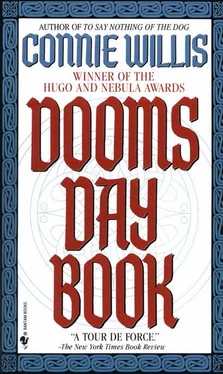Dunworthy thought of simply barging in on the examination, but he didn’t want to risk being barred from hospital altogether, and at any rate, Badri was in no condition to talk. He had been clearly unconscious when they took him out of the ambulance. Unconscious and with a fever of 39.5. Something wrong.
The registrar was looking suspiciously up at him. “Would you mind terribly giving me that spelling again?”
He spelled Chaudhuri for her and then asked where he could find a telephone.
“Just down the corridor,” she said. “Age?”
“I don’t know,” he said. “Twenty-five? He’s been at Balliol for four years.”
He answered the rest of her questions as best he could and then looked out the door to see if Gilchrist had come and went down the corridor to the telephones and rang up Brasenose. He got the porter, who was decorating an artificial Christmas tree that stood on the lodge counter.
“I need to speak to Puhalski,” Dunworthy said, hoping that was the name of the first-year tech.
“He’s not here,” the porter said, draping a silver garland over the branches with his free hand.
“Well, as soon as he returns, please tell him I need to speak with him. It’s very important. I need him to read a fix for me. I’m at—” Dunworthy waited pointedly for the porter to finish arranging the garland and write the number of the call box down, which he finally did, scribbling it on the lid of a box of ornaments. “If he can’t reach me at this number, have him ring the casualties department at Infirmary. How soon will he return, do you think?”
“That’s difficult to say,” the porter said, unwrapping an angel. “Some of them come back a few days early, but most of them don’t show up until the first day of term.”
“What do you mean? Isn’t he staying in college?”
“He was. He was going to run the net for Mediaeval, but when he found he wasn’t needed, he went for home.”
“I need his home address then and his telephone number.”
“It’s somewhere in Wales, I believe, but you’d have to talk to the college secretary for that, and she’s not here just now either.”
“When will she be back?”
“I can’t say, sir. She went to London to do a bit of Christmas shopping.”
Dunworthy gave another message while the porter straightened the angel’s wings, and then rang off and tried to think if there were any other techs in Oxford for Christmas. Clearly not, or Gilchrist wouldn’t have used a first-year student in the first place.
He put a call through to Magdalen anyway, but got no answer. He hung up, thought a minute, and then rang up Balliol. There was no answer there either. Finch must still be out showing the American bellringers the bells at Great Tom. He looked at his digital. It was only half-past two. It seemed much later. They might only be at lunch.
He rang up the phone in Balliol’s hall, but still got no answer. He went back into the waiting area, expecting Gilchrist to be there. He wasn’t but the two medics were, talking to a staff nurse. Gilchrist had probably gone back to Brasenose to plot his next drop or the one after that. Perhaps he’d send Kivrin straight into the Black Death the third time round for direct observation.
“There you are,” the staff nurse said. “I was afraid you’d left. If you’ll just come with me.”
Dunworthy had assumed she was speaking to him, but the medics followed her out the door, too, and down a corridor.
“Here we are, then,” she said, holding a door open for them. The medics filed through. “There’s tea on the trolley, and a WC just through there.”
“When will I be able to see Badri Chaudhuri?” Dunworthy asked, holding the door so she couldn’t shut it.
“Dr. Ahrens will be with you directly,” she said and shut the door in spite of him.
The female medic had already slouched down in a chair, her hands in her pockets. The man was over by the tea trolley, plugging in the electric kettle. Neither of them had asked the registrar any questions on the way down the corridor, so perhaps this was routine, though Dunworthy couldn’t imagine why they would want to see Badri. Or why they had all been brought here.
This waiting room was in an entirely different wing from the casualties ward. It had the same spine-destroying chairs of the waiting room in Casualties, the same tables with inspirational pamphlets fanned out on them, the same foil garland draped over the tea trolley and secured with bunches of plastene holly. There were no windows, though, not even in the door. It was self– contained and private, the sort of room where people waited for bad news.
Dunworthy sat down, suddenly tired. Bad news. An infection of some sort. BP 96, pulse l20, temp 39.5. The only other tech in Oxford off in Wales and the bursar out doing her Christmas shopping. And Kivrin somewhere in 1320, days or even weeks from where she was supposed to be. Or months.
The male medic poured milk and sugar into a cup and stirred it, waiting for the electric kettle to heat. The woman appeared to have gone to sleep.
Dunworthy stared at her, thinking about the slippage. Badri had said the preliminary calculations indicated minimal slippage, but they were only preliminary. Badri had told him he thought two weeks’ slippage was likely, and that made sense.
The farther back the historian was sent, the greater the average slippage. Twentieth-Century drops usually had only a few minutes, Eighteenth-Century a few hours. Magdalen, which was still running unmanneds to the Renaissance, was getting slippage of from three to six days.
But those were only averages. The slippage varied from person to person, and it was impossible to predict for any given drop. Nineteenth Century had had one off by forty-eight days, and in uninhabited areas there was often no slippage at all.
And often the amount seemed arbitrary, whimsical. When they’d run the first slippage checks for Twentieth Century back in the twenties, he’d stood in Balliol’s empty quad and been sent through to two a.m. on the fourteenth of September, 1956, with only three minutes’ slippage. But when they sent him through again at 2:08, there had been nearly two hours’, and he’d come through nearly on top of an undergraduate sneaking in after a night out.
Kivrin might be six months from where she was supposed to be, with no idea of when the rendezvous was. And Badri had come running to the pub to tell him to pull her out.
Mary came in, still wearing her coat. Dunworthy stood up. “Is it Badri?” he asked, afraid of the answer.
“He’s in the casualties ward,” she said. “We need his NHS number, and we can’t find his records in Balliol’s file.”
Her gray hair was mussed again, but otherwise she seemed as businesslike as she was when she discussed Dunworthy’s students with him. “He’s not a member of the college,” he said, feeling relieved. “Techs are assigned to the individual colleges, but they’re officially employed by the University.”
“Then his records would be in the Registrar’s Office. Good. Do you know if he’s travelled outside England in the past month?”
“He did an on-site for Nineteenth Century in Hungary two weeks ago. He’s been in England since then.”
“Has he had any relations visit him from Pakistan?”
“He hasn’t any. He’s third generation. Have you found out what he’s got?”
She wasn’t listening. “Where are Gilchrist and Montoya?” she said.
“You told Gilchrist to meet us here, but he hadn’t come in yet when I was brought in here.”
“And Montoya?”
“She left as soon as the drop was completed,” Dunworthy said.
“Have you any idea where she might have gone?”
No more than you have, Dunworthy thought. You watched her leave, too. “I assume she went back to Witney to her dig. She spends the majority of her time there.”
Читать дальше












